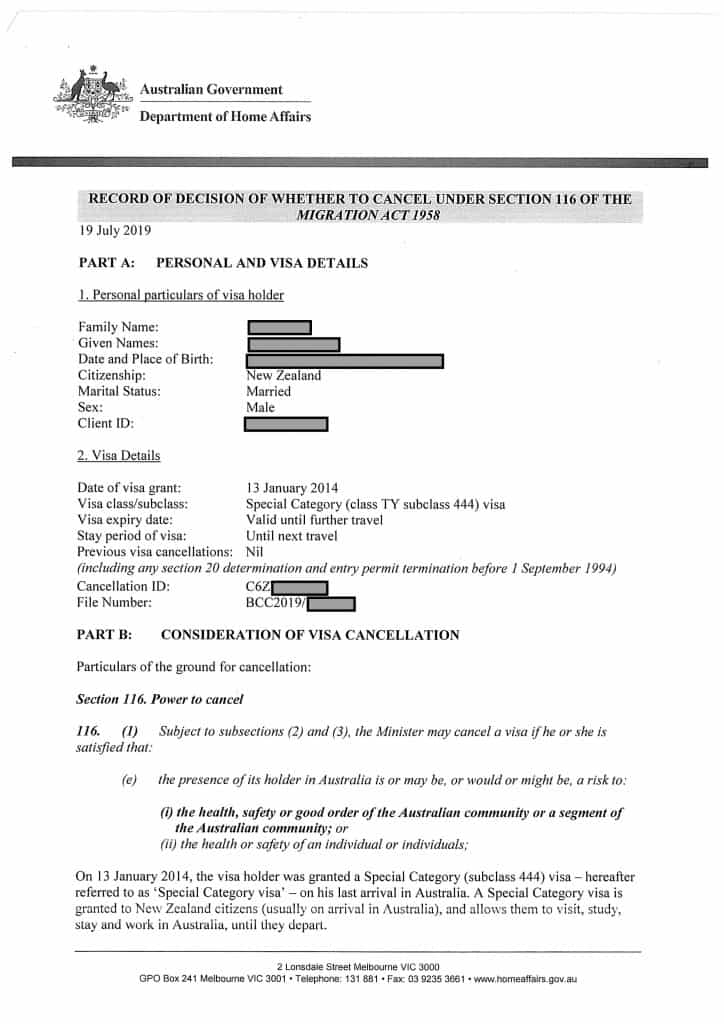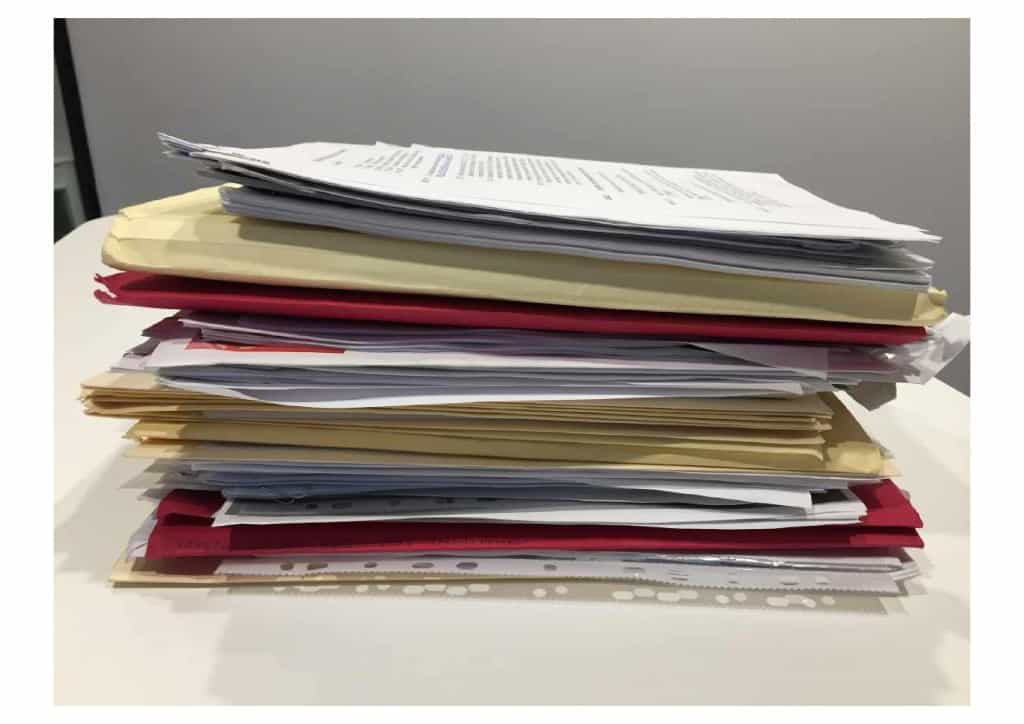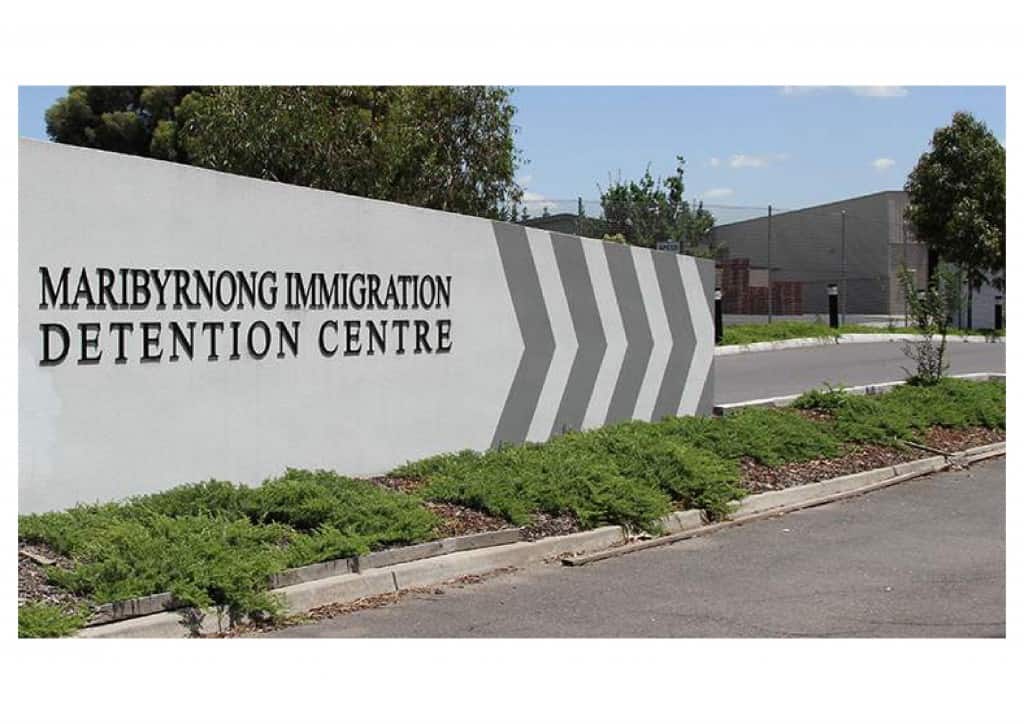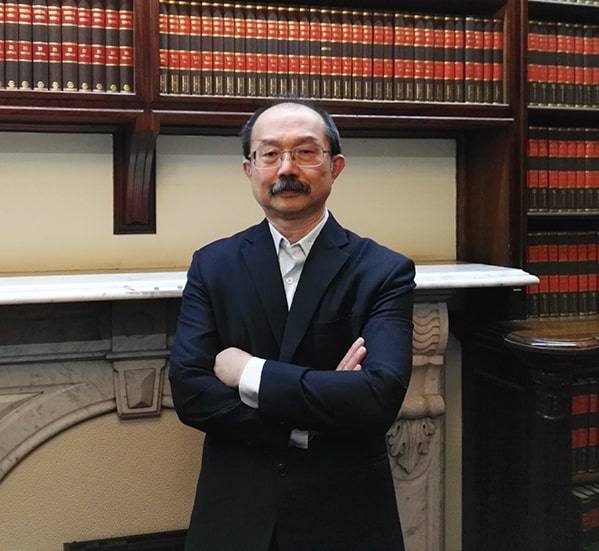
Section 116 Visa Cancellation – How to Prevent Section 116(1)(e)(i) Cancellation
Section 116 Visa Cancellation power gives the Minister of Immigration (Home Affairs) the power (under section 119 – click here to learn more) to issue a Notice of Intention to Consider Cancelling (or NOICC) a temporary visa if he believes that you are or may be, or would be, a risk to the health, safety or good order of the Australian community or a segment of the Australian community (under section 116(1)(e)(i)).
A temporary visa can also be cancelled if you failed the character test (click here to learn more about section 501 visa cancellation on character ground) or click here to learn more about mandatory visa cancellation.
Generally, section 116 of the Migration Act 1958 only provide the Minister and his delegates discretionary power to cancel a temporary visa (click here to learn more). The decision maker must consider whether the visa should be cancelled. What factors that must be taken into consideration is not specified. Section 116 allows the Department of Immigration to cancel your visa for a variety of reasons, including:
- you may pose a risk to the health or safety of the community; or
- you failed to comply with the conditions of your visa; or
- you are not a genuine temporary entrant, for eg, as a student; or
- the Department is not satisfied with your identity, for eg, you provided false or fake identification document; or
- you provided false information to the Immigration.
This article is about section 116(1)(e)(i) discretionary visa cancellation.
However, you can challenge Section 116 Visa Cancellation decision by providing supporting documents to argue that your visa should not be cancelled, or Section 116 Visa Cancellation should be revoked or set aside by the AAT (click here to learn more about AAT merits review).

Section 116(1)(e)(i) visa cancellation decision
Section 116(1)(e)(i) Visa Cancellation Test
The threshold in this Section 116 Visa Cancellation is very low as the test is very broad to include if:
i. you are; or
ii. you may be; or
iii. you would be; or
iv. you might be
a risk to the:
- health;
- safety; or
- good order
of the Australian community or a segment of the Australian community.
In addition, if you are charged with an offence against the laws of the State or Territory, your visa may be cancelled under section 116(1)(g) on grounds prescribed in r. 2.43 of the Migration Regulations 1994 (click here to learn more). If you are put on good behaviour bond instead of being imprisoned, this can also be ground for visa cancellation. You should note that the Department of Immigration cannot use section 116(1)(g) power to cancel your BVE or TY-444 visa.

Provide evidence to prevent Section 116(1)(e) Visa Cancellation
- Statement of Facts outlining the charges
- Court outcomes documents or Court briefs
- If you were given bail, whether you complied with your bail conditions
- AFP National Police Certificate detailing all your offences and sentences
- Your statement explaining the cause or underlining reasons to, or for, your offending; explaining your ties with Australia and with your home country; whether your offending was or was not beyond your control; your remorse; explaining the adverse interaction with the criminal justice system has been a salient lesson for you and the need for you to address your offending behaviour; your compliance with your visa conditions; give an undertaking or assurance to be of good behaviour in the community and not to engage in any behaviour that would bring you within the ambit of the criminal justice system; and what would stop you from acting out in an inappropriate way in the future
- Letters of support from your family, friends, employer, work colleagues, clubs and others
- Letters from your family members detailing how your deportation will affect them, eg emotional and financial hardship and whether they feel threatened by you
- If you have a job, a letter from your employer detailing how they value you and whether they can find a replacement for you if you were deported – whether your skills and occupation is in shortage or in demand
- Evidence of having made positive contributions to the Australian community, eg mentoring other people, participation with sport clubs, volunteering, etc
- Provide evidence that you are taking positive and proactive steps to rectify your behaviour or taken appropriate action to overcome the reasons for your offending, eg, Anger Management course, Salvation Army’s positive lifestyle program, Alcoholics Anonymous meetings (if relevant to your offending)
- Provide evidence that you have been rehabilitated
- Letters of apology to your victims and your appreciation of the harm caused
- Statement of Fines and Penalties imposed by the Court
- Psychologists’ reports (eg Assure Programs), including assessment of risk of re-offending
- Evidence of having or not having family back in your home country
- Sentencing Magistrate’s sentencing remarks:
- whether the objective seriousness was at the lower end of the scale
- whether the offence was planned or not
- whether the offending was short in length or not
- whether you were cooperative with the police
- whether you were provoked or acted in self-defence
- whether you have shown genuine remorse and contrition
- whether you were given discount on your sentence
The decision maker is required to give weight to the evidence you provided in assessing whether Section 116 Visa Cancellation should be exercised (Botha v MIBP [2017] FCA 362 – click here to read the full case).
In Leota v Minister for Immigration, Citizenship, Migrant Services and Multicultural Affairs [2020] FCA 1120, the Court at [63] accepted that the ‘risk’ you may post to the community as an element of futurity and reliance on your past offending alone may not be sufficient, depending on the circumstances, to justify cancelling your visa. For example, you are 50 and you have only been convicted only 1 occasion of stealing a LV bag, it cannot be said that there is a risk of further criminal conduct or non-observance of the law and there is a risk to the good order of the Australian community. The decision-maker must have regard to your prospect of re-offending. In short, a past conviction will of itself necessarily be sufficient to disclose the relevant risk (Tien v MIMA (1998) 89 FCR 80). In any case, the decision-maker is required to set out in some detail the basis upon which it is contended that your conviction supports a finding of risk to the community (Leota at [65]). You should be aware that the nature of your past offending, if serious, the risk to the community from a repeat of such offending is obvious and the it is open to the decision-maker to be concerned as to ongoing risk. The decision-maker is obliged to identify and explain the nature of the risk before cancelling your visa (Nevall v MIMA [1999] FCA 1624)
If you have been charged but not convicted yet, the decision-maker must not put too much weight on the charge as it has not been proven yet.
If the Department decided that there is ground to exercise the section 116 visa cancellation, the following will be considered:
Circumstances in which Section 116 Visa Cancellation ground arose
- What was the offending
- Whether the offending was beyond your control
If your visa has been cancelled because of your criminal offending, your should provide character statements from people, including your work colleagues, who are aware of your previous offending. In their statement, they must state that they are aware of your offending and whether or not you will offend again (and provide the reasons for having this belief). The decision-maker is required to assess if you are allowed to remain in Australia whether you posed a risk of reoffending. If you provide character statements, the decision-maker must take proper account of the character evidence as relevant to the risk of future offending. It is a necessary part of the decision-maker’s assessment as to the risk of criminal conduct in the future, must assess the character and circumstances both at the time of the offending and at the time of assessment. These character statements should say, for eg, you are of good character and did not pose a risk of reoffending using words such as “…. had grown and matured since the period of offending”. They are relevant and material to the assessment of your risk of reoffending. The decision-maker cannot conclude that you will reoffend simply because of your past offending unless your character remained unchanged from the time of your offending (Anees v MIBP [2020] FCFAC 28). The decision-maker must consider the character statements that you had grown and matured such that you would not behave in the same way in any future circumstances.
Character witnesses are relevant in deciding whether there is a risk that you would engage in further criminal conduct if you are permitted to remain in Australia as they provide important insights to your enduring character and whether you are the same person you had been at the time of your offending or had changed for the better.
Past and present behaviour towards the Department of Immigration regarding Section 116 Visa Cancellation
- Whether you were cooperative with the Department of Immigration when issued with a NOICC informing you of Section 116(1)(e)(i) Visa Cancellation
Whether there are persons in Australia whose visas would, or may be, cancelled under section 140 because of your section 116 visa cancellation
- Whether there are any secondary visa holders on your visa
Whether there are mandatory legal consequences to a Section 116 Visa Cancellation decision
- Whether you can apply for another visa onshore, if not, you will be held in immigration detention until removed
- Whether you will be affected by PIC 4013 or 3 year ban and you would not be eligible to apply for another visa because of failing section 501 character test (click here to learn more)
- Whether you will be prevented by section 48 bar (click here for more learn more) and can only apply for very limited number of visas prescribed under r. 2.12 (click here for Medical Subclass 602 visa; Protection Subclass 866 visa; certain Bridging Visas; Partner visa)
- Whether you will become an unlawful non-citizen and if you do not voluntary depart Australia will be detained under section 189 and removed from Australia under section 198
Whether Australia has obligations under international agreement that would be breached as a result of Section 116 Visa Cancellation
- if there are children involved – Convention on the Rights of the Child or CROC (Art 3). Click here to learn more about CROC.
- if there are family members involved – International Covenant on Civil and Political Rights or ICCPR (Arts 17 and 23). Click here to learn more about ICCPR.
Whether your removal will breach Australia’s non-refoulement obligations
- whether you will be persecuted or suffer harm if you are returned to your home country (click here to learn more about Protection Subclass 866 visa)
Any other relevant matters
- whether protection of the Australian community outweigh exercising Section 116(1)(e)(i) Visa Cancellation

Apply for a Bridging Visa if detained in immigration detention centre
If you are detained in an immigration detention centre you may be able to apply for a Bridging Visa E so that you may be released back to the community. However, the Department of Immigration may refuse to grant you a Bridging Visa E if you have criminal record. You can apply to the AAT within 2 days of receiving the refusal decision (click here to learn more). Section 74(2) prevents you from lodging another Bridging Visa E until after 30 days from the date of your last refusal unless the Minister is satisfied that you meet the criteria for the grant of the visa (reg. 2.23).
If your visa has been cancelled, you may be prevented for 3 years from applying for another visa (click here to learn more).
You should note that if your visa application has been refused or your visa cancelled while you are in Australia, you may be prevented from lodging another visa application (click here to learn more about section 48 bar and visa application limitations).
Your visa, including permanent residence visa can also be cancelled under section 109 if you have provided incorrect information in a visa application (click here to learn more).
Note that the Department can also cancel your temporary or permanent visa without giving you notice to you while you are outside Australia, click here to learn more about section 128 visa cancellation without notice while you are out of Australia.
Australian migration law is complex and difficult to understand, contact our immigration lawyer for a consultation (fee applies) to help you with Section 116(1)(e)(i) Visa Cancellation or click here to find your answers.
This article is not intended to be or taken as migration legal advice. The author of this article disclaims any liability for any action or omission on the information provided or not provided in this article. You should always consult an immigration lawyer or a registered migration agent to form an informed opinion on your immigration matter.

 041 222 4020 or WeChat: AUDvisa
041 222 4020 or WeChat: AUDvisa



